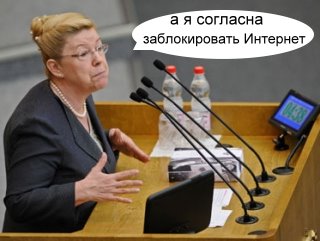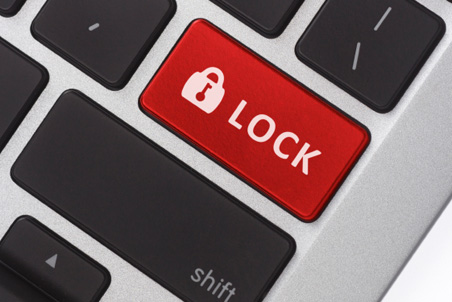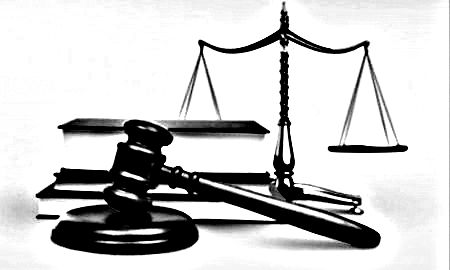The next version of the "anti-piracy" law, which will block any site

This week, another event occurred in the State Duma that is important for the further regulation of copyright in the digital age.
Rallies, petitions, objections of specialists of the whole industry, user outrage. All this does not touch the
')
At the same time, the situation very much resembles the sequence of actions of lawmakers a year ago: first, the Ministry of Culture issues its own version of the “anti-piracy” bill, which begins to be discussed with the Internet industry and then suddenly a completely different document is introduced in the State Duma in which the opinion of IT business and society is absolutely not reflected.
It happened this time too: the Ministry of Culture put forward its new version of the “anti-piracy” bill for public discussion, at the site of Roskomzakon (dedicated to the public discussion of laws regulating the Internet) all comments and suggestions from the public and experts on it were collected with further presentation to all interested parties . And there is another spit in the direction of society and without taking into account its interests, without waiting for the presentation of the results of public discussion, a new law will be adopted, expanding the scope of the "anti-piracy" 187-FZ to all objects of copyright and related rights.
At the same time, the presidential administration disowned its involvement in the bill of the vice-speaker of the State Duma, claiming that the introduction of the bill is the initiative of the deputy himself. But if in Russia, indeed, the legislative power was separated from the executive, then it could still be believed, but knowing the situation from the inside, it is difficult to imagine that Zheleznyak acted without the consent of the deputy head of the internal policy department of the presidential administration, Radiy Khabirov, who heads the anti-piracy working group under the presidential administration. Meanwhile, according to the source of the newspaper “Vzglyad” in the State Duma, Zheleznyak was instructed to submit a bill from the speaker of the lower house, Sergei Naryshkin.

And yesterday, there was information that another well-known supporter of locks, Elena Mizulina, joined the bill.
Let me remind you that lately there have been many options for such bills . In addition to various variations of the bill from the Ministry of Culture, offering the most stringent copyright protection options on the network, these were the bill from the Communist Party of the Russian Federation (repealing the anti-piracy law), the bill from Schlegel and Maksakova (also expanding the scope of the anti-piracy law), the bill from Govorukhin, Spring, Shaidenko and Levin (introduction of penalties for non-performance). In my opinion, all of the submitted bills were to be put into the trash can without any discussion, and from the proposed to adopt only the bill of the Communist Party of the Russian Federation, providing for the complete abolition of the previously adopted No. 187-FZ (anti-piracy law). After all, unfortunately, all the above-mentioned legislative initiatives still poorly regulated modern relations between users and right holders, and did not solve the main problems of content turnover in the network that today objectively exist in the digital space.
What are the main innovations of Zheleznyak in the new bill?

First of all, it is possible to block sites for violation of any copyright and related rights.
Here, either the deputy does not have any idea what the Internet is, and what copyright is, or, lobbying the interests of some specific structures, he absolutely does not care what the adoption of such a law can turn into. Considering that by virtue of Art. 1259 GK objects of copyright include any work, regardless of the merits, purpose and mode of expression, the bill will create fertile ground for the widest abuse in competitive wars between site owners, as well as for judicial trolling sites. This is not to mention the violation of the fundamental right established by Article 29 of the Constitution (the right to access, receive and disseminate information), which today has become a rule when it comes to mention.
Clarifies the blocking mechanism for providers of illegal content
From the explanatory note: “The telecom operator blocks not a specific place in the content, but all illegal content in accordance with the effective judicial act. In the event that a telecom operator does not have the technical ability to limit access to illegally placed information, the telecom operator is obliged to limit access to such an information resource. ”
It is hard for me to comment on this point, because it is beyond my understanding about content in the digital world. What was meant by the author of the bill (mixes, complex audiovisual works, compilations, databases, torrent files and magnet links that lead to many different works), apparently, only he knows. Neither the bill nor the explanatory note discloses the indicated mechanism.
In addition, it is not clear from the bill what is considered a “technical possibility”, but it can be assumed that even if the court decides to block a specific url and the site works on the https protocol, no one will be able to block a specific page. In this case, the provider will block the entire IP or even a group of IP addresses. You can easily imagine a situation where, due to one amateur photo or poem, which are undoubtedly the objects of copyright, a multi-million social network can be blocked.
The liability of the provider (telecom operator) is limited to the responsibility to the copyright holder and to the user for restricting access to information and (or) restricting its distribution.
Previously, the “anti-piracy law” contained a provision whereby hosts and site owners are not responsible for blocking content, individual pages and the entire site due to anti-piracy measures, now providers are also protected by law from lawsuits and complaints from users, authors, other copyright holders. , advertisers and other third parties if they, having no “technical ability”, blocked the site entirely in order to execute the court decision.
Blocking content / page / site is provided not only for violation of exclusive (property) rights to a work, but also for violation of personal non-property rights.
According to Art. 1255 of the Civil Code of the Russian Federation the following rights belong to the author of the work:
1) the exclusive right to work;
2) the right of authorship;
3) the author's right to name;
4) the right to inviolability of the work;
5) the right to publish the work.
I don’t want to escalate the situation, but in accordance with the letter of the bill, such large sites as YouTube, Wiki, VK, FB, Twitter, etc. can now be blocked even if a work published with the consent of the copyright holder contains an error in the name author, either if the author is not specified, or if a piece of the work will be cut without the name of the author.
The Moscow City Court considers as a court of first instance civil cases related to the protection of copyright and related rights in information and telecommunication networks, including the Internet, and for which they have taken preliminary security measures
This innovation proposes to give the Moscow City Court exclusive jurisdiction not only to take interim measures in connection with the infringement of copyright and related rights on the Internet, but also on all claims of infringement of copyright / related rights. As soon as this provision is very much stuck out because of its apparent contradiction to the foundations of the Constitution and the CPC. If no one wants to listen about the violation of the rights of users and site owners, then this norm deprives the right holders from all over the territory of a huge country who have the right to defend their rights in the way proposed in the bill.

The entry into force of the law is proposed to establish from July 1, 2014.
And of course, as always, the adoption of the bill will not require any expenses from the state budget.
The deadline for submitting comments, suggestions and comments to the committee is 06.03.2014, and the proposed date for consideration in the Duma is 01.03.2014. It is immediately evident that the next proposals on the draft law from the industry and society are eagerly awaiting in the Duma.
Source: https://habr.com/ru/post/284880/
All Articles